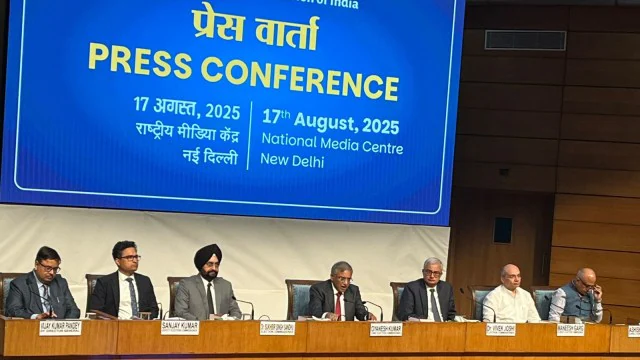Affidavit or Apology to the Nation”: CEC Hits Back at Rahul Gandhi’s Explosive ‘Vote Chori’ Charge

Image via The Indian Express
Date: Monday, August 18, 2025
New Delhi: India’s election watchdog has issued one of its strongest warnings in recent memory. Chief Election Commissioner (CEC) Gyanesh Kumar has asked Congress leader Rahul Gandhi to either provide a sworn affidavit supporting his allegations of “vote chori” (vote theft) or issue an unconditional apology to the people of India.
This dramatic showdown comes after Gandhi’s fiery remarks during his “Voter Adhikar Yatra” in Bihar, where he accused the Election Commission of aiding the ruling party in manipulating the Special Intensive Revision (SIR) of electoral rolls. The controversy has sparked heated political exchanges and raised questions about electoral integrity ahead of upcoming polls.
CEC’s Clear Stand
Addressing the press on Sunday, CEC Gyanesh Kumar made it clear that democracy cannot function on baseless charges. He said:
- “Words like vote chori are not only inappropriate but also an insult to the Constitution.”
- “If anyone has proof, they must present it under oath through a sworn affidavit.”
- “Otherwise, they should apologise to the nation for spreading misinformation.”
This was Kumar’s first major press conference since taking over as CEC in February. He stressed that allegations of fraud without evidence weaken public trust in elections. The Commission, he said, cannot entertain rhetoric but will always act on legal proof.
The ECI also underlined that the SIR process in Bihar was being conducted with transparency. Booth-level officers, political party representatives, and voters themselves are part of the process. “It is meant to clean up voter rolls, not manipulate them,” Kumar explained.
The Background: Rahul Gandhi’s ‘Vote Chori’ Remark
Rahul Gandhi’s accusation came during his campaign in Bihar last week. He claimed that over one lakh fake voters had been identified in Mahadevapura, Karnataka, and alleged that the Election Commission was allowing similar discrepancies in Bihar under the SIR exercise.
He repeatedly used the phrase “vote chori,” alleging that democracy was under threat because the ruling BJP was “stealing votes” with the help of a biased poll panel.
The statement created a political storm. Gandhi positioned himself as a defender of voters’ rights, but the ECI dismissed his words as baseless and misleading.
Election Commission’s Rebuttal
The Commission categorically rejected Gandhi’s charges. It stated:
- All political parties are treated equally by the ECI.
- Every voter has the right to file claims and objections during the revision period.
- Legal mechanisms, such as election petitions within 45 days of polls, exist to address genuine grievances.
The ECI argued that Gandhi’s slogans were not only factually incorrect but also disrespectful to democratic institutions. The Commission added that calling voters “fake” without evidence is unlawful.
Rahul Gandhi Fires Back
Rahul Gandhi, however, doubled down. He asked why only he was being asked to file an affidavit, while Union ministers like Anurag Thakur—who also made strong statements—were not held accountable in the same way.
The Congress party echoed this concern.
- Jairam Ramesh, party general secretary, said the CEC’s words sounded like “threats.”
- Pawan Khera accused the Commission of intimidating the opposition instead of probing irregularities.
Congress leaders insisted Gandhi’s remarks were based on the Commission’s own data. They argued that instead of demanding affidavits, the poll panel should answer questions about the discrepancies raised.
What’s at Stake?
This clash goes beyond a war of words. At the heart of the issue lies the credibility of India’s democratic system. If voters lose faith in the electoral rolls, trust in the results will also weaken.
For the Election Commission, protecting its image as a neutral referee is crucial. Any perception of bias could damage its authority. For the Congress, raising doubts over voter rolls gives it a rallying cry against the BJP.
Observers note that with Bihar elections on the horizon, this issue has taken on added political weight. The Commission has set September 30 as the deadline for finalizing the electoral rolls. That means any objections or corrections must be raised before then.
The Larger Political Context
Rahul Gandhi has been trying to revive his party’s fortunes by taking aggressive positions on issues of governance and democracy. His “Voter Adhikar Yatra” is designed to highlight alleged institutional bias.
The BJP, on the other hand, has dismissed his claims as “frustration politics.” Party leaders argue that Gandhi is attempting to create an atmosphere of distrust because the Congress has been unable to win people’s confidence on the ground.
Independent analysts say the episode could energize Gandhi’s support base but may also backfire if he fails to produce concrete evidence.
CEC’s Warning: A Test for Democracy
CEC Gyanesh Kumar’s words were sharp. By demanding either an affidavit or an apology, he has put the ball squarely in Gandhi’s court. The Commission’s tough stand signals that it will not allow its reputation to be tarnished without a fight.
At the same time, critics argue that such public confrontations risk politicizing the Election Commission itself. They warn that the body must not be seen as siding with one party against another.